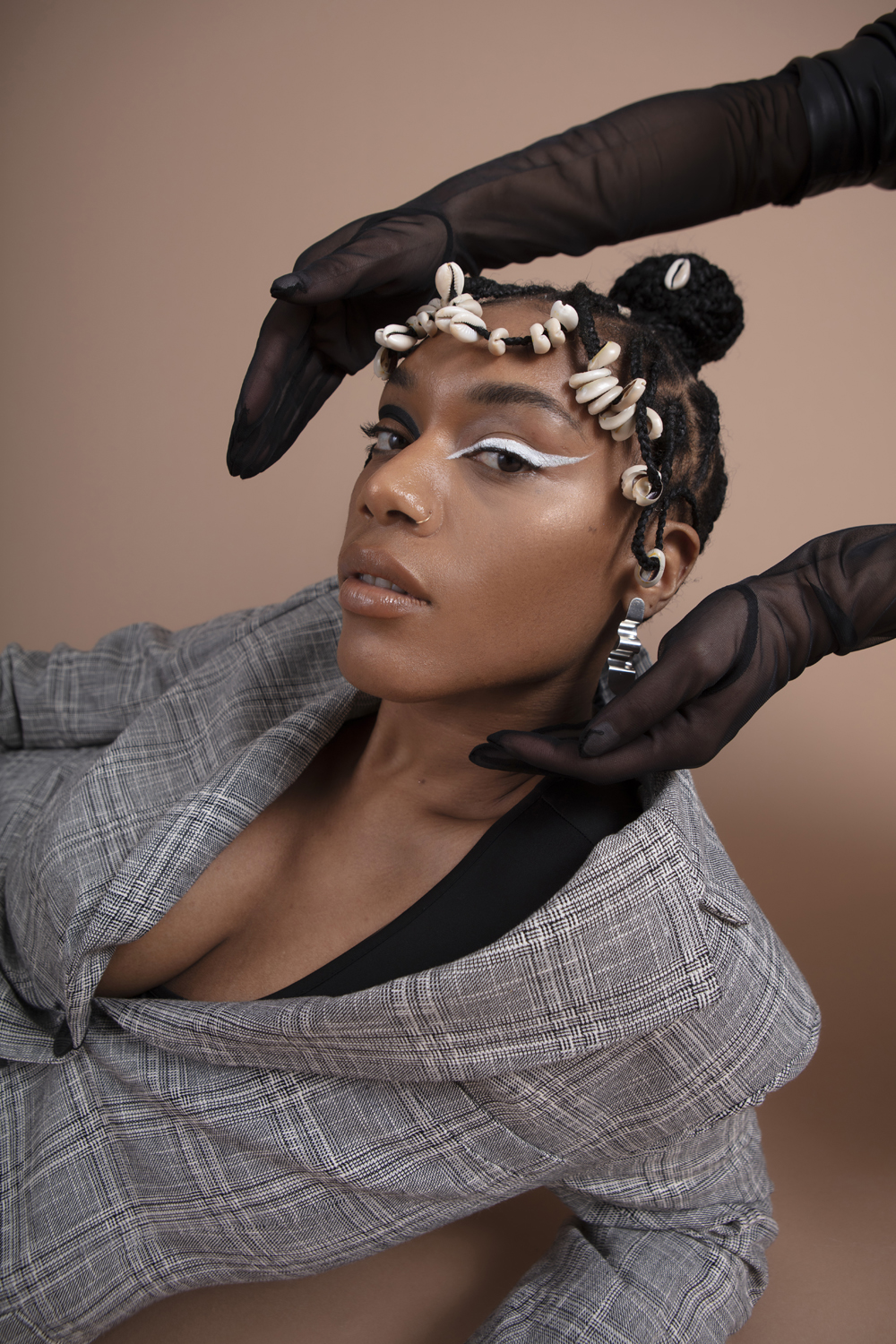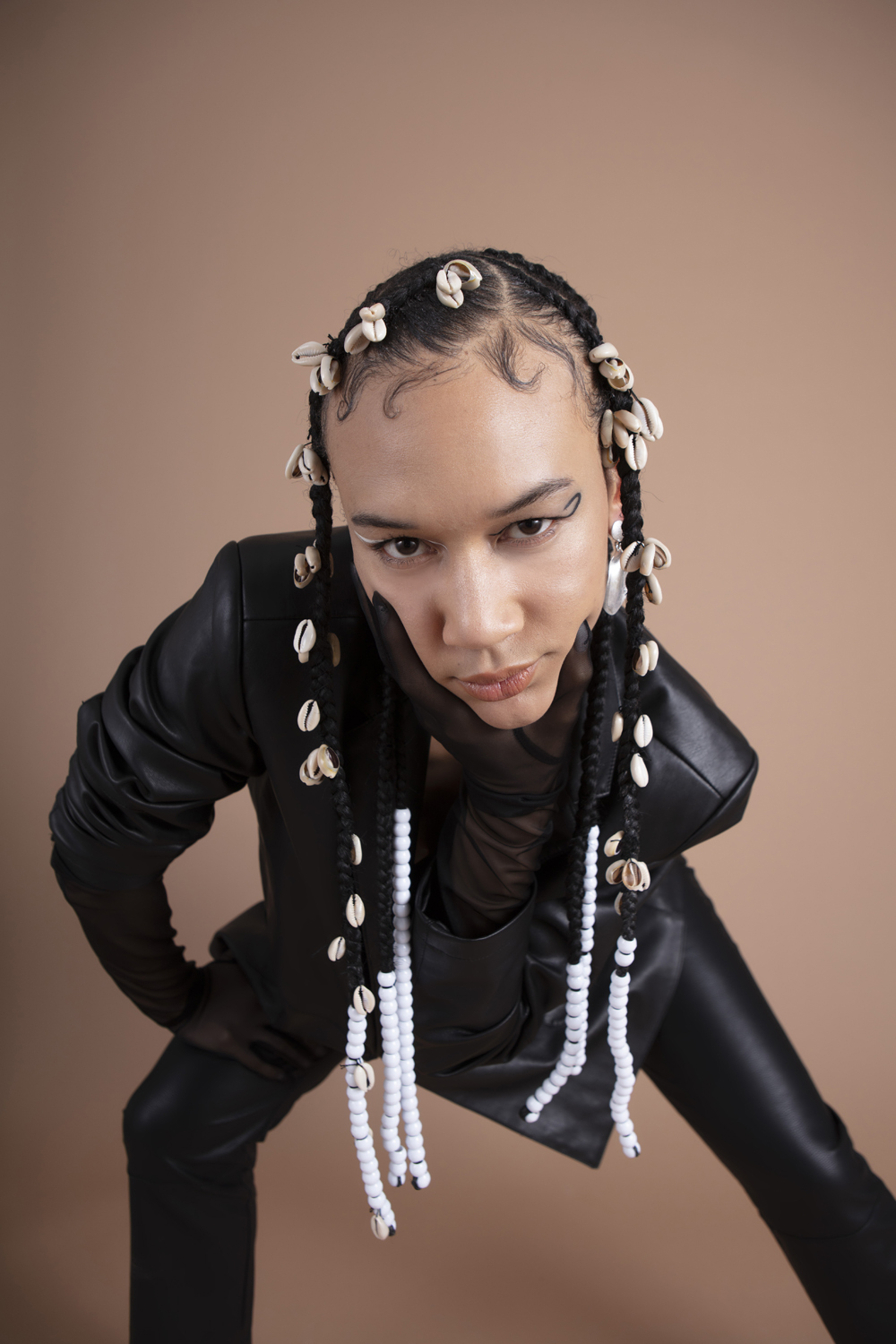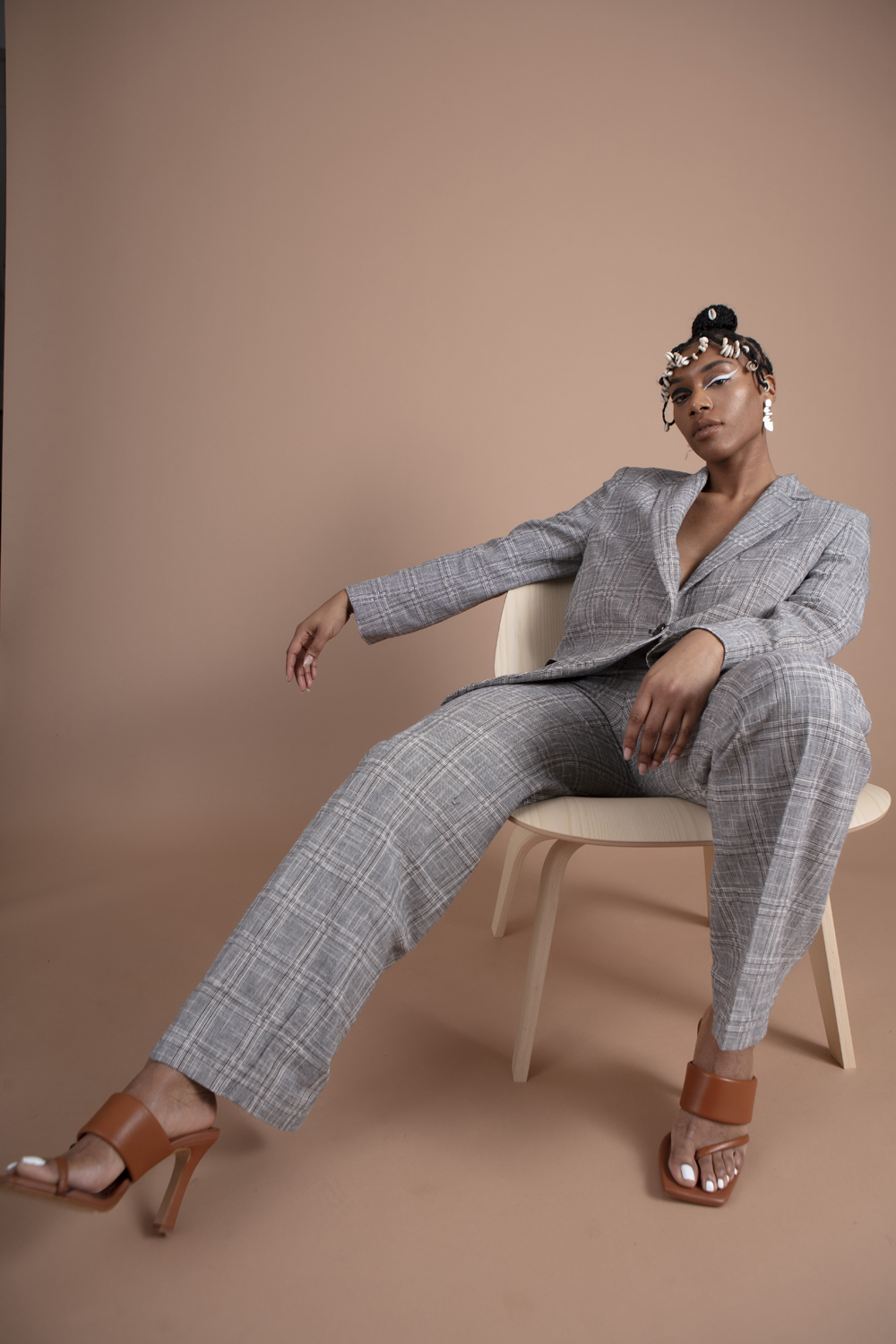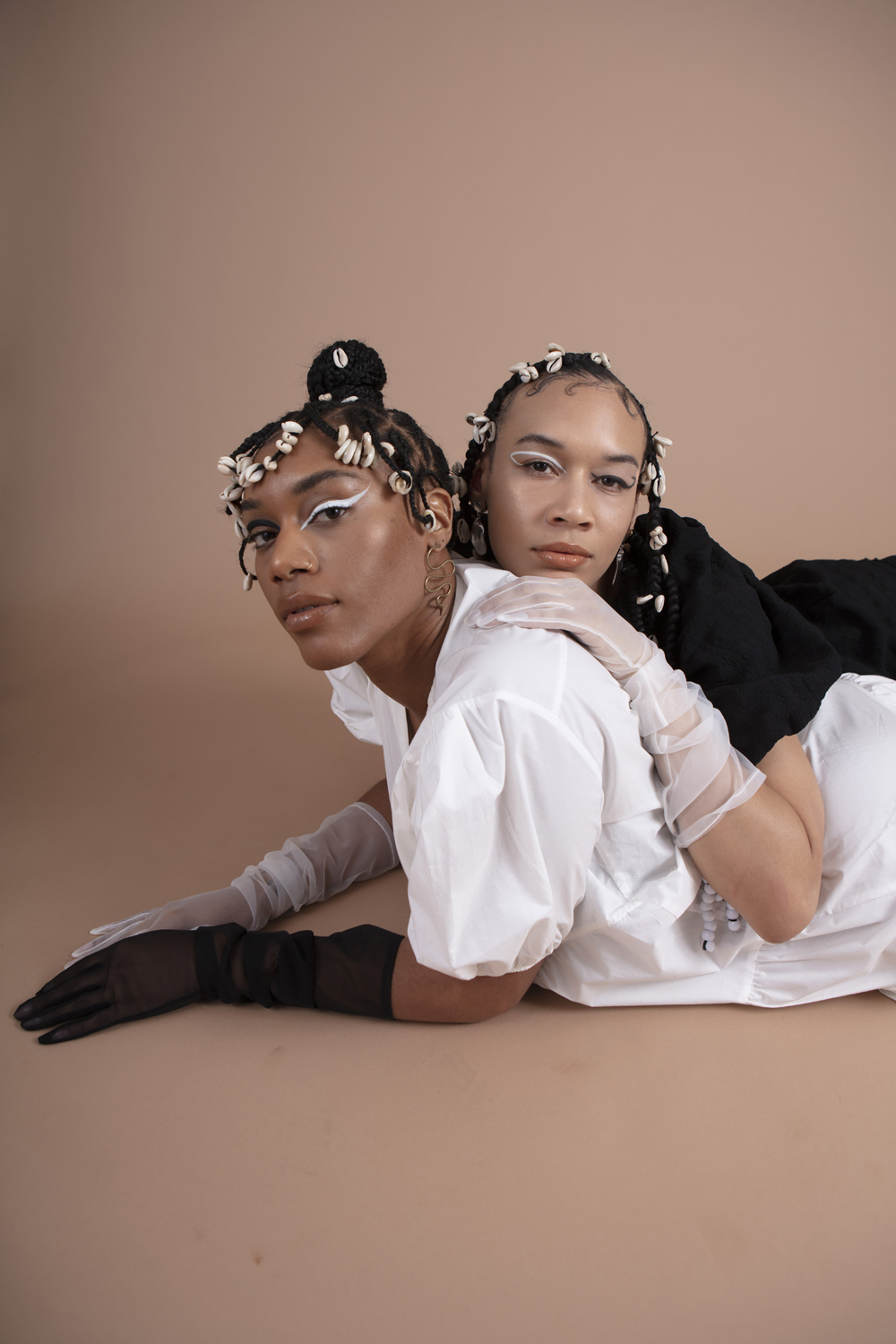
Rachel Topping is in an Uber riding through Chinatown with the windows down, headed to the airport during our interview. In between answering questions, she’s been appreciating the hot summer breeze and the very post-apocalyptic scene in the semi-deserted downtown New York.
The oldest of 5 girls, Topping grew up in a blended family with blended hair types. Three years ago she was with one of her sisters to do a photoshoot when they starting venting about how rarely they saw coarse, Black hair associated with high fashion and how that needed to change.
Every black girl can relate to this sentiment. The ingrained hatred of black hair in America coexists with the racism, the injustice, and the pain. We are miseducated from a young age to believe every extension of ourselves was not to be loved and could not be tamed. These societal roundhouse kicks are meant to hurt, they are meant to emit shame, a quiet rage at your reflection. But just like every black woman’s root, strength is a core element that does not waver easily.
“It’s pretty difficult to be a Black woman in America and not create self-worth based on the way that you look. We grew up in a time where it was considered embarrassing to be “just Black”. It was seen as nothing to be proud of. We were aware and told regularly that we had “bad” hair, so we spent a lot of time trying to learn to correct it. Once we were old enough to afford to do our own hair we explored weaves and wigs. Subconsciously, I think we’d tried to forget about the hair that was naturally growing from our heads.” Rachel says.
So she co-opted what it meant to be nappy-headed, something to be proud of, a source of joy and pride.
“When we started as an Instagram account. We joked around about names like the beady-beads only club, or the my-hair-shrinks-when-its wet-club. The goal was to just reshare images that made us feel proud to be black girls with 4c hair. Over the years the platform has evolved into a bustling clothing brand, which brought us full-circle as fashion and design have always been a passion for us both.”
Nappy Head Club has become an enlightening community of like-minded spirits to uplift the mental, creative and physical health of people of color. We chat with Rachel about being in the club.
Tell us, what is the Nappy Head Club?
Nappy Head Club is a community, first and foremost. It’s a place of acknowledgment for the under-represented and under-appreciated and a safe space for black folx. But of course, we’re also a clothing brand. We use fashion as a vessel to open dialogue, break down and process traumas, and instill pride.
This seems like such a reclamation on words that were used to hurt young black kids i.e, “You nappy-headed…” I love that.
Absolutely. “Nappy” was thrown around at my house my entire childhood. I was the black girl with nappy hair. With the beady-beads. With no hang-time. Reclaiming that word for us is about taking back our narrative, taking back the power. It also speaks to the spirit of the brand: we’re okay with being controversial. For us, it’s not about being PC at all times, but using discomfort to provoke dialogue and growth.
Did you guys ever go through a return to the natural state? What was that like for you? I remember years on perming, cutting, perming pieces, cutting until I said “NO” about 15 years ago.
My “big chop” moment happened for me in college. I’d tried to do a perm myself at home (see: broke college student) and ended up severely damaging my hair. At that point, I really didn’t have much of a choice, and a few of my friends either just went natural or were considering it, so I took the plunge. I remember being at my dad’s house for spring break, marching upstairs, and just cutting it all off. I came to dinner unbothered with a whole new look. I really loved it in the beginning, it was very short and so easy to manage. I felt like it gave me a bit of edge and it was fun to discover what my curls looked like.
At the beginning of the natural hair movement there wasn’t much representation of type 4 hair, so what started out as fun and exciting very quickly turned into feelings of inadequacy as my hair was growing in, kinky as ever, and I was desperately trying to mimic YouTubers with looser curl patterns. After about 6 months of that, I started wearing wigs and weaves again. My natural hair really wouldn’t make another appearance for about 3 years.
I’m still on that second journey, it still feels new. I’m still learning my hair, still building a relationship. Some days I love how I look, and some days I give myself permission throw on a wig. I try to be gentle with myself.
Why do you think the return to natural, or being natural is such a political statement?
Black hair is such a political statement because it has been policed for countless generations. Blackness as a whole, as a part of conquest for dominance and control, has been suppressed. Wearing natural hair sends a message: I am okay just like this. I am proud and unashamed of my heritage. That strikes a chord for those wanting to maintain dominance. Black pride is loud, it’s colorful, it’s dynamic. It can effortlessly take over a room. The Black Panthers showed us that. There is a particular faction of people who see this as a threat. They don’t want to see the repercussions of the power of black self-love.
What was your household like regarding hair? I remember my dad always wanted us to keep our hair clean! That means no locks, very clean cut naturals or perms or braids. I remember my mom perming my and my sister’s hair when we were as young as five. It alls seems traumatic now but I realize that was the “style” or just an easy way to maintain 4 girls.
The hair texture of my family members ranges, as black families go, and I was very aware from a young age that my 4c hair left something to be desired. It was always “I don’t want to do her hair.” “It doesn’t lay down.” “It’s so nappy.” I can’t fault my family for the things that were said, they were simply a reflection of society’s anti-black conditioning.
My sister and I’s experience having 4c hair is a lot of the reason that Nappy Head Club exists. In order for us to reclaim our self-image, we needed to radically distance ourselves from any self-loathing. We wanted to surround ourselves in imagery that validated us. We wanted to share that feeling with as many people as we could.
At a recent Thanksgiving, one of our relatives actually took the initiative to apologize for some of the comments they’d made about our hair as children. This, to me, made me feel like the work we’ve been doing with Nappy Head Club is truly making an impact. It means so much to see the change starting in your own intimate circle.
What has your platform giving you in terms of community?
One of the things I love most about Nappy Head Club is collaborating with other creatives and creating beautiful works of art. The platform has given me such a beautiful and talented friend group. We create together from a place of genuineness, there’s always this energy of comradery onset that is unmatched.
Do you plan to expand?
Absolutely! It’s happening even without us really planning it. The platform is ballooning and demand for our products is at an all-time high. We’re moving into bigger facilities, looking for opportunities to move into brick and mortar spaces, and looking to build out our international community more in the coming years. We’re also evolving our collections every drop, there’s so much more to come.
When was the first time you felt beautiful?
In answering this I had to be very honest with myself because it’s not easy to admit it, but the first time I remember feeling beautiful is very telling. The first memory I have of truly feeling “beautiful” was my first weave. It was senior year and my mom let me get a weave (they weren’t cheap) for my senior photos. I remember feeling transformed. Like I was finally beautiful. I finally held value. Obviously there is a lot to unpack with this moment. Having 4c hair I never felt like it complied, I felt like everything and everyone around me was demanding that I change it, pull it back, flatten it straight, braid it, put it away, please.
My first moment feeling beautiful in my natural hair was actually fairly recent. I think it’s important to note that loving your hair, and learning to STYLE your hair to your liking are not always the same journey. I’d grown to appreciate and value my kinky tresses but I didn’t understand them for a very long time. The first time I felt beautiful in my hair was when I finally got a Flexi rod set to come out how I wanted. I remember proudly staring in the mirror at myself, and at my hair, and thinking wow this is really me. This is me I want people to see. I like her. I don’t think I’ve ever gotten that flexi rod set to look like it did that day again lmao. Thank God for the photos.
What was your experience with race and media growing up as a kid? What sort of shows did you watch? How did the messages affect you?
I grew up watching a lot of shows, some black, some white. I also grew up in a pretty diverse town so I was around a lot of different people. I felt like I understood race, there were white kids, there were black kids, and maybe a few Latinos. That was my world. One thing that was rare, however, were black girls that looked like me. I’d watch Raven, In the House, Fresh Prince, and I saw black girls but they usually had long hair and more biracial looking features. When I would see myself, hair standing straight up going every which way, I never really understood why I didn’t look like those black girls. Like I was defective. I spent a lot of time trying to mimic those features in high school, wanting to be mistaken for one of those girls. It took a lot of unpacking & unlearning in my adult years to overcome those feelings.
Give us three things to add to our toolkit of life and diversity?
1 – A friend with opposing perspectives from you, to keep you balanced
2 – A trip to the Cape Coast Castles in Ghana
3 – A good deep conditioner, seriously
Has anyone ever asked you to touch your hair? Describe the feeling? For me…I guess violation, anger, confusion…
Unfortunately, I haven’t had the honor of side-stepping a Karen-who-tried-it, to date. But one memory that comes to mind was in middle school, one of my classmates asked me how I got the parts in my hair (I had cornrows) Do you use a razor to etch the lines in? I didn’t answer her, I just rolled my eyes. It was definitely a bit infuriating, But it also made me realize how freaking amazing black hair is. This little girl probably spent that entire civics class trying to figure out my hair. I never had to ask her how she got her hair in that messy bun, it was pretty obvious. But my intricate side-swoop cornrow ponytail had consumer her entire 4th period.
What do you love most about your hair?
The thing I love most about my hair is that we’re still figuring each other out. We have this awkward kinship where some days she’ll do what I want, and some days humbles the shit out of me. This journey to understanding my hair and appreciating her is so seamlessly tied into my personal journey of self-love. Every new curl I discover, deep treatment, or style trick I’m falling in love with myself a little more.
What do you love most about yourself?
I love my creator’s spirit. My partner often points out how almost anything I like or appreciate, I’ll take a few minutes to assess, and declare, “I can do this!” Nappy Head Club was born out of that spirit. I never really ask myself if I can do something, it’s always how. Owning a business can be STRUGGLE, it really can. There is so much to know, so many hurdles to overcome. I love my ability to trudge past all those hurdles.
What is it like being a black woman through your eyes.
Salty and sweet, I would say. Being a black woman is amazing, we’re fun, we’re brilliant, we’re the sh*t! Currently, I work with mostly black people doing mostly black things and it feels good. I feel like I’m making a difference. And I’d just like to add, loving being around black folk isn’t anti-white. It’s a nod to feeling truly safe and understood. It’s what every white person feels like every day at work, I’ve just been lucky enough to have a sprinkle of what that comfort feels like.
It hasn’t always been this way, though. As a child my blackness made me feel inadequate. I wasn’t mixed, I didn’t have loose curls, and I felt that I didn’t have value. I would wear wet-and-wavy weaves and grey contacts to try to convince the world that I was worthy of appreciation.
I trudged my way through the entertainment industry, often where blackness was something to ogle and entertain you but not to value. I felt ostracized often, and alone. Being a black woman we carry a lot of weight, shoulder a lot of responsibility. It’s not easy to be a black woman, most certainly, but I can’t imagine life any other way.
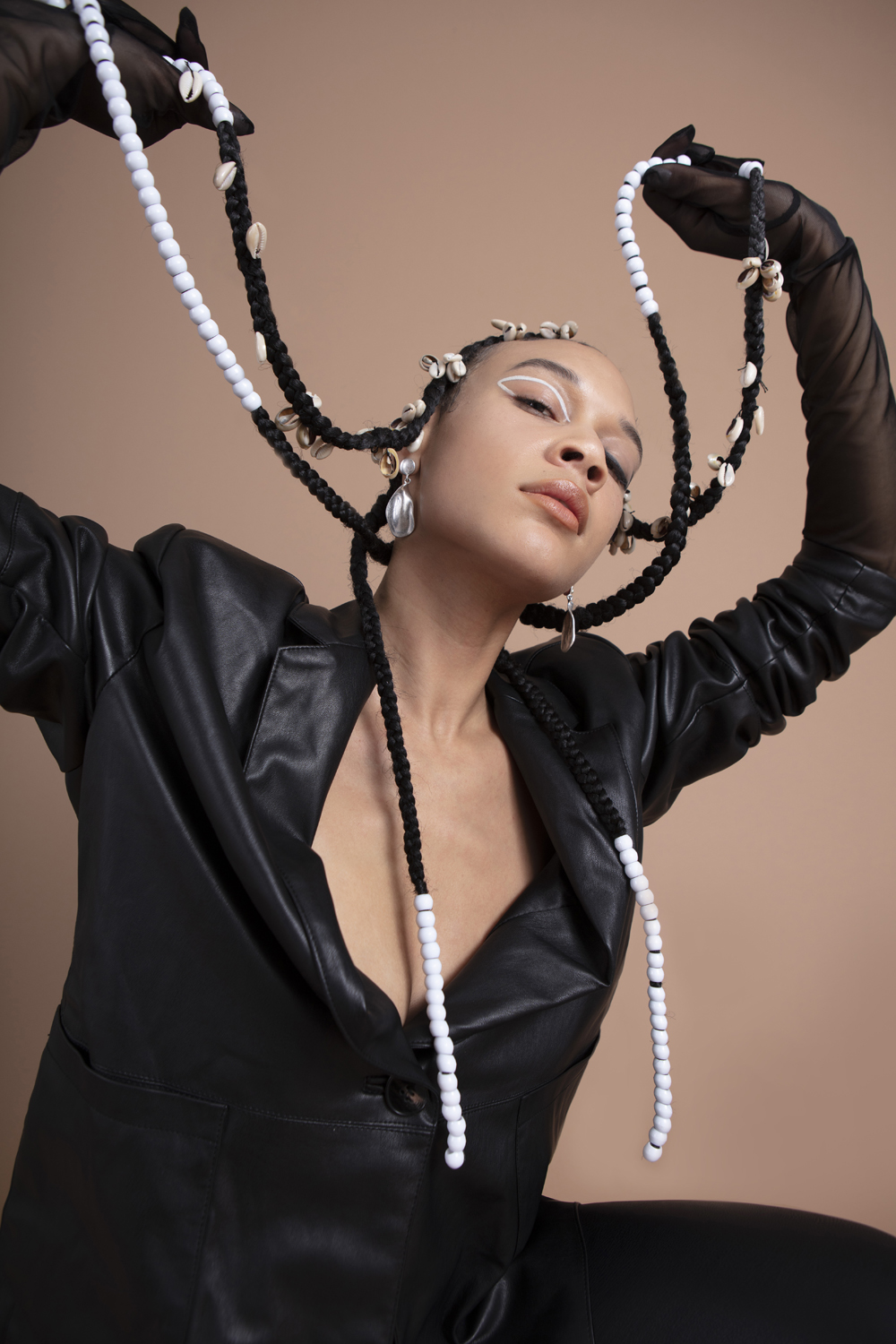
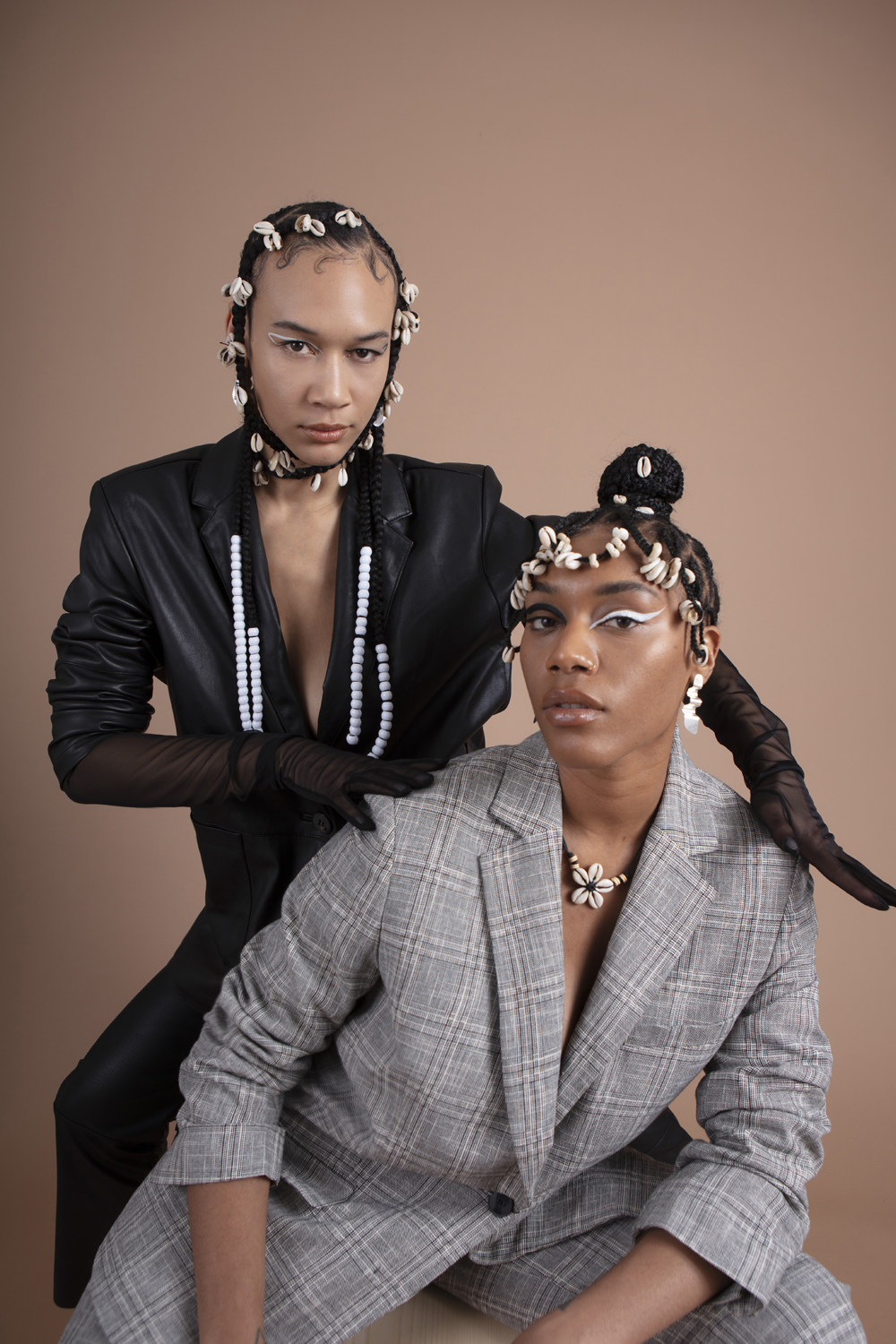
All clothing, Zara. earrings, Edas / @__edas. earrings, Awoke Vintage / @awokevintagebrooklyn. earrings, AGMES JEWELRY @agmesnyc.
CONNECT WITH NAPPY HEAD CLUB:
photos / Sabreen Jafry / @b_reen
styling / Rikki-Richelle / @rikki___richelle + Nikosi / @fxckwitniko
models / Rachel Danielle @rachel___danielle + Rikki-Richelle / @rikki___richelle
makeup / Cirsty Burton / @cirstyburton
hair / PS / @psimdope

